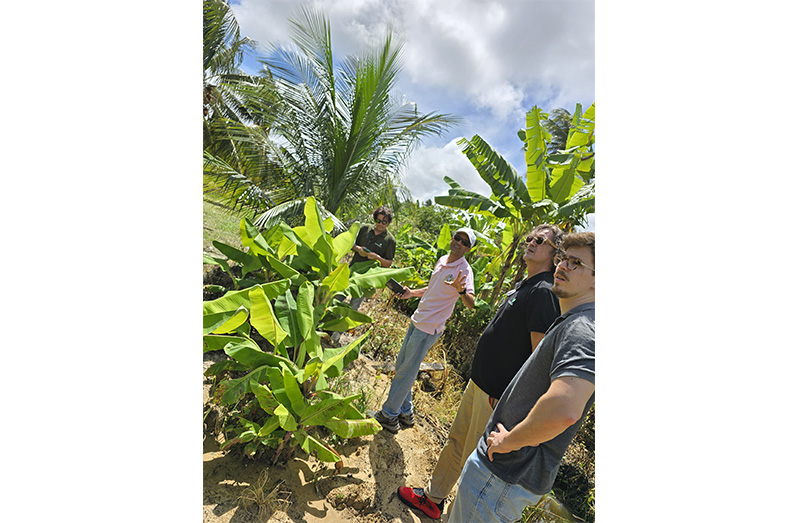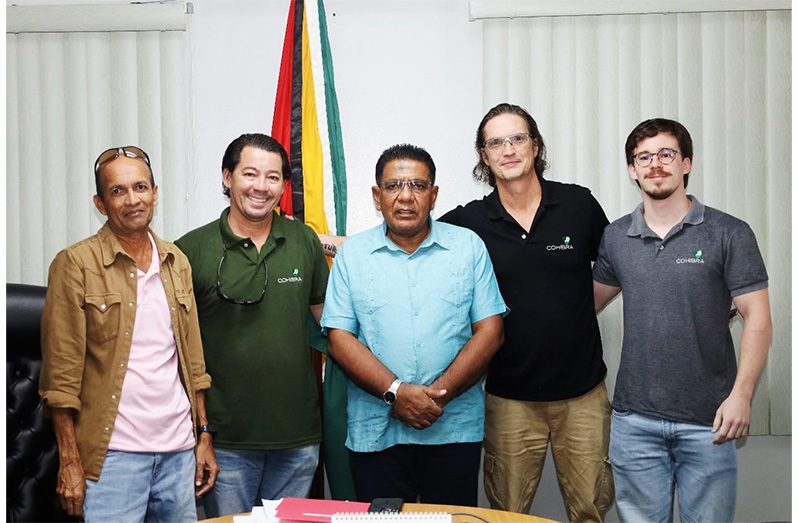- Minister Mustapha proposes farmer training exchange with Brazil’s COHIBRA
WITH contagious optimism and a shared vision for sustainable agriculture, a high-level team from ( Technology in the Production of Coconut Trees) COHIBRA, Brazil, recently concluded a landmark visit to Guyana—where they were greeted by a transformed coconut industry, one revitalised through strategic government investment, international collaboration, and community commitment.
The visit served as both a symbolic and practical milestone, marking three years since the Guyana Government embarked on an ambitious journey to revamp the once-declining coconut sector. And at the heart of this revitalisation stands Hope Coconut Estate—an agricultural hub that, not long ago, was teetering on collapse.

“We started with only five coconut seed bins. We could only afford 1,500 seed nuts. Today, we have 10 nurseries across the country producing 216,000 seedlings annually,” shared Mr. Ricky Roopchand, Managing Director of the Hope Coconut Estate. Under the stewardship of President Irfaan Ali’s administration and the leadership of Agriculture, Minister Zulfikar Mustapha, the estate has become a beacon of progress and possibility.
Mr. Roopchand recalled inheriting an industry that was “literally bankrupt.” But with sustained government support, including the implementation of the national coconut sensitisation and decentralised seedling programmes, the estate has now expanded beyond all expectations. From an initial target of 3,000 acres, Guyana’s coconut cultivation now spans over 7,000 acres—thanks in large part to seed nuts from COHIBRA, which have exceeded 100,000 in number to date.
PARTNERSHIP ROOTED IN GROWTH
The COHIBRA representatives came to Guyana with a clear agenda: to witness firsthand the development of the seed nuts they had supplied, engage with local farmers, and assess the overall health of the industry. What they found exceeded their expectations.
“We were delighted with how the seed nuts were meticulously arranged in the bins and the health of the nurseries we visited,” said Tiago Seixas Themudo, Caribbean Export Manager at COHIBRA. “The fertility of the soil here is truly remarkable.”
But more than just observing progress, Themudo’s team engaged in deeper discussions with farmers and government officials—culminating in a meeting with Minister Mustapha that opened new doors for co-operation.
Minister Mustapha proposed a bold next step in the partnership: training Guyanese coconut farmers at COHIBRA’s facilities in Brazil. The initiative, Themudo explained, is designed to boost farmers’ knowledge of advanced techniques and management practices, enhancing their capacity to sustain and grow the industry.
“Guyana has competent people leading this project. With the right knowledge and continued support, the coconut industry here will explode,” Themudo stated, visibly impressed by the passion of the Minister and the progress on the ground.
He further commended President Ali’s government for promoting sustainable agriculture, not just in Guyana but throughout the region. “It’s the right perspective. This kind of development cannot be done alone. With pooled knowledge and shared resources, everyone benefits. We are a poor region, but, together, we are strong,” Themudo added.
Lailton Arruda Barreto Filho, Director of New Projects Operation at COHIBRA, highlighted the profitability and low maintenance of the coconut business, calling it a “golden opportunity” for both large-scale and small-scale farmers.
“Coconut farming is inclusive. One tree can last up to 50 years. If you treat the tree well, it will treat you well in return,” added COHIBRA’s CEO, Lailton Arruda Barreto, reinforcing the long-term value of investment in the sector.
Barreto said Minister Mustapha’s training proposal would be especially important in dispelling fears and encouraging hesitant farmers to join the sector, equipped with better knowledge and a support network.
FROM UNCERTAINTY TO REGIONAL LEADERSHIP
The story of Guyana’s coconut resurgence also holds a lesson in perseverance and partnership. When local officials first sought to introduce new coconut varieties—after 40 years without change—they faced international reluctance. But COHIBRA stood out.
“Many countries were hesitant to share with Guyana, but COHIBRA was different. Through CARDI, we connected with them, and they showed a willingness to help,” Roopchand explained.
He described the Brazilian varieties provided as some of the best in the world, well-suited to Guyana’s climate and soil. What’s more, the results have exceeded expectations: while the variety is expected to bear fruit in 36 months, COHIBRA representatives witnessed coconut trees producing within 22 to 28 months.
SEEDS OF A SUSTAINABLE FUTURE
The collaboration between COHIBRA and Guyana goes beyond commercial exchange—it’s a shared investment in sustainable development, knowledge transfer, and regional agricultural security. With expanding nurseries, thriving acreage, and empowered farmers, Guyana’s coconut industry is no longer an overlooked sector but a shining example of what can be achieved through vision, unity, and commitment.
As Brazil and Guyana deepen their agricultural ties, the humble coconut may well become a symbol of regional resilience—and a cornerstone of economic diversification in the Caribbean.



.jpg)










